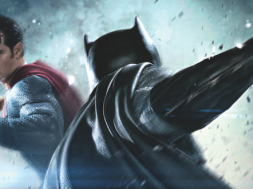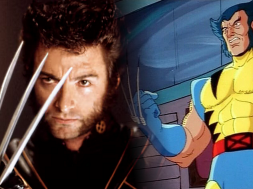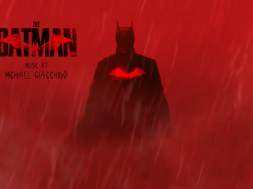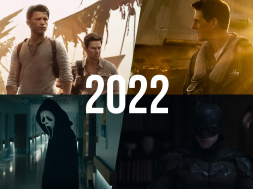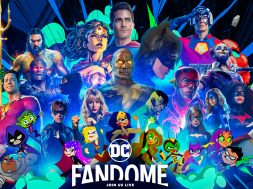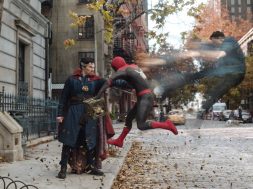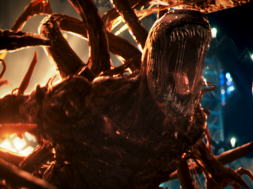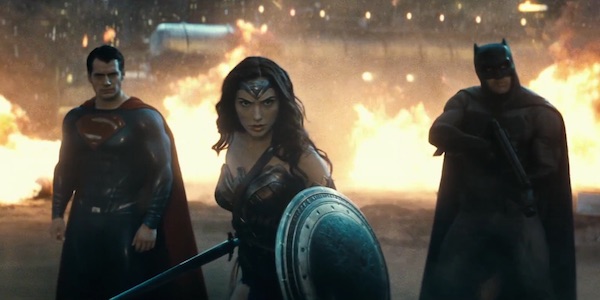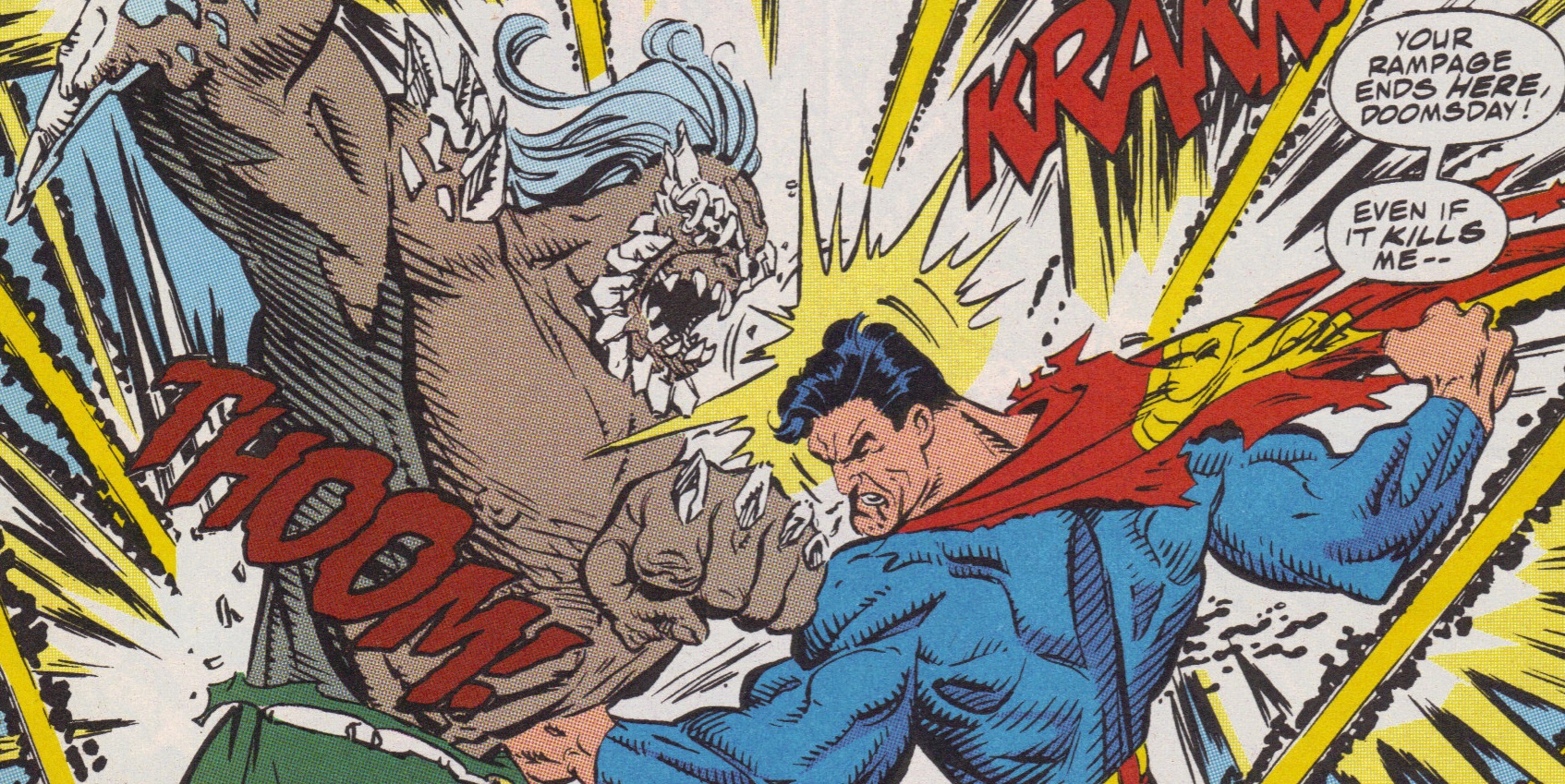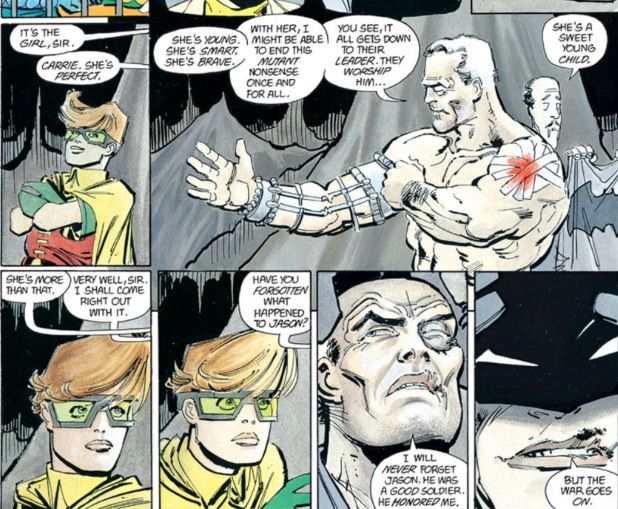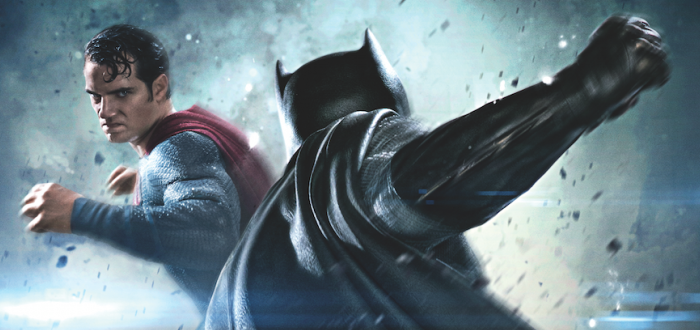
[Warning: Full Spoilers For Batman V Superman: Dawn Of Justice, The Dark Knight Returns And The Death Of Superman]
There’s no 100% right way to interpret an existing comic book character. Batman V Superman: Dawn of Justice acknowledges this, like predecessor Man of Steel, by being largely its own establishing shot of some of DC’s most well-known characters. That said, BvS is much more aesthetically in service of its inspirations than Man of Steel was, with many aspects coming from seminal DC works, most crucially The Dark Knight Returns and The Death Of Superman. However, Batman V Superman: Dawn Of Justice isn’t interested in being an adaptation of either The Dark Knight Returns or Death Of Superman. It doesn’t want to translate those books themselves, rather, it aims closer to being a translation of what they represent.
The tone of Batman V Superman is ripped almost totally from the pages of Frank Miller‘s TDKR, using the dimly lit, cynical worldview of that book to the fullest. Within minutes, Superman’s best pal Jimmy Olsen is executed point blank before Superman himself kills a man using brute strength. Director Zack Snyder makes it known very early that his brand of comic book movie will continue to be in the vain of the grittier, more self-indulgent image of these heroes found in the DC books of the ’80s and ’90s. Not that the film cares for how those stories reflect their medium: how together they helped compound a heightened sense of story for these characters. Instead, it takes the parts that are easiest to consume wholesale, leaving only a husk of faux-intellectual darkness – morality without interrogation, martyrdom without burden. The titular conflict of BvS that Returns portrays has next to zero dramatic effect outside of two titans fighting, while Superman’s eventual sacrifice is almost nothing like that depicted in The Death Of Superman. Both setpieces exist only to enact a two-for-one kind of excitement, with Wonder Woman’s inclusion thrown in for good effect.
BvS does this without even a hint of self-awareness. Batman explodes, shoots and otherwise sentences unnamed criminals to certain death without a hint of irony in the story-telling. The only excuse is that Bruce and Alfred have “always been criminals”. Meanwhile, the entire feature is built around questioning Superman, on laying all blame at his feet and the one time he gets to answer back literally blows up in his face. The disjointed plotting makes only the dimmest of excuses for either character’s misgivings, tinging the writing with lethargy – it would’ve been far more difficult to choreograph a Batman not flippantly killing people so carelessly or write a character-defining speech for Superman, so let’s not bother. Both would require deep engagement of both the characters and the screenplay, things conspicuously absent. The lack of irony in these depictions creates an antagonistic subtext that the producers don’t care for what these icons mean to people and that they know, by being a certain level of pessimistic and gritty, by having just enough hints of the biblical DC graphic novels fans hold so dear, enough audience will show up that they’ll make their money and won’t need to care what anyone actually thinks of the movie.
In this way, Dawn of Justice is a distillation not of the actual victories of these texts, but of their frustration. It comes across as an attempt at re-enactment of the cultural wave these books came in on, trying to be relevant by being the edgy, dark, unpredictable choice. “The Marvel Cinematic Universe is suitable for families as standard, but this had to be edited down to meet a child-friendly rating. And, not only is it depicting one of the most culturally shocking events in the medium, it’s doing two, at once!” It’s rebellion against a machine that’s already been dismantled, and has been for years. Batman V Superman is the rendition of these iconic books that’s still arguing that comics can be more than sponges for children’s pocket money. The movie acts as though Deadpool didn’t happen this past February and Marvel haven’t already redefined the term “comic book movie” and that somehow, the world still needs convincing that superheroes can be pertinent to both adults and kids alike.
It’s a treatment of comic books and their most defining works that isn’t cause for celebration; it’s belittling. Frank Miller; Alan Moore; Dan Jurgens; Jim Starlin et al. – their penmanship was earth-shattering in what it did for the comic industry. They, among others, took story-telling in comics to places previously unheard of. They meditated on deep loss and tragedy and vastly explored the complications of living in a world where superpowered people exist. But the regurgitation of their ideas that occurs in Zack Snyder‘s DC mash-up is one that only betrays their intention, reducing Batman and Superman down to costumed mascots for a gorge of special effects, meandering brutality and mindless world-building. It may bear a passing resemblance, but Batman V Superman‘s complexity is very alien to the actual nuance that exists in the volumes that were its alleged forebear.
No one single character arc holds steady, nor does any single character’s motivations remain constant. The closest is Bruce Wayne’s mission to eliminate Superman, but even that begins to lack legitimate incentive as the film wears on, his initial anger giving way to pathological obsession. Lex Luthor begins as a calculating genius before eventually kidnapping Superman’s mother and unleashing Doomsday, neither having any true logic to them other than to be the vehicle that drives the last act.
The result is a screenplay absent of logical consistency. There’s no anchor, no moral fiber that holds the story together. Certainly, it’s possible to see the realization of Superman’s worth as a hero as the lynchpin of the film’s philosophy, but a lack of screentime makes the son of Krypton seem more like a co-star in his own movie. Even if we’re meant to disagree with everyone disliking this Superman, the film does a very poor job of demonstrating such with Luthor’s initial intent of a contingency plan should the alien go rogue seeming the smartest action of the entire movie. Most of the film seems deadset on minimizing or erasing Superman, before Bruce stoicly says “I failed him in life” over his grave, as if suddenly then the weight of Superman’s sacrifice should mean something.
In The Dark Knight Returns, Superman is a lackey of the government and Batman is a vigilante of justice he’s sent to take care of. The story breaks down the two characters into their archetypes and then bounces them off each other, Superman being for the perceived greater good, with Batman doing what really needs to be done. Their ideological unease is a direct analogy for the paranoia surrounding Reaganomics and the huge military increase that occurred during the eighties, to the point where Ronald Reagan is the president Superman serves under, giving the order to stop Batman for “national security”.
The opening scenes of Batman V Superman invoke imagery of 9/11, showing an on-the-ground perspective to Man of Steel‘s climactic battle. Superman isn’t a tool for the government, he’s shown as an invading force that is of a greater danger to society than his uses. Bruce Wayne and Lex Luthor both see this and begin working on ways to counteract the risk of Supes’ unlimited power going rogue. Lex goes the official route by attempting to court the government, whereas Bruce decides to take on Superman in battle himself.
These are starting points that could easily forge a post-modern deconstruction, and reconstruction, of The Dark Knight Returns in a post-9/11 light. The paranoia over immigration, the effectiveness of military intervention, how corporations like Google influence how the western world now protects and insulates itself. With the “Superman is an immigrant” angle, his eventual sacrifice could indeed mean something very grave and wholesome to anyone watching. Instead, the movie uses such themes sparingly as mere surface tension to fill up space from the film’s beginning to its big climax. The film’s architecture fluctuates in such a way that any ideas that would lead to in-depth character reflection and analogy are used only for a moment, leaving a feeling of being simultaneously over-complicated and under-stimulated. When the resolution finally comes, it has no sense of legitimate finality, neutered of meaning by scattered plotting and unsteady character building.
Superman and Batman are arguably the most legendary in how they’ve grown to represent virtuous objective. Whether it’s Superman reminding Batman of how important the ideal of being “someone who doesn’t want to see anybody die” is to him in Kingdom Come, or Batman informing Green Lantern that even though his methods are unorthodox Gotham’s “streets are safer, even from the cops” in All-Star Batman And Robin, they’re heroes that work for a common, greater good with two very different sets of means and tools. The apocalyptic, brooding Batman and Superman of Batman V Superman: Dawn of Justice are both drastic offshoots of their most celebrated iterations that ultimately leaves neither representing much of anything except more loud, dimly lit, special-effects driven sequels. There’s no 100% correct way to represent or use these heroes in a story, but there are ways to misrepresent them and get them wrong. Batman V Superman gets its heroes wrong and expects us to be glad of it. Expects us to be relieved they’re finally making these movies at all, even at the cost of what their subject matter can really mean. The last 30 years of comic books have tried to teach us to be smarter than that. Perhaps we should heed their wisdom.
